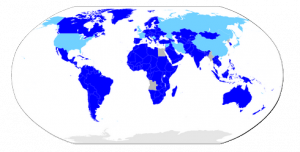Chemical weaponsLibya’s remaining chemical weapons materials removed
The director-general of the Organization for the Prohibition of Chemical Weapons (OPCW), ambassador Ahmet Üzümcü, announced a milestone in the operation to verifiably eliminate Libya’s remaining chemical weapons stocks by confirming that the chemicals have been successfully removed from Libya on 27 August 2016.

States parties to the Chemical Weapons Convention in 2015. Light colored territories are those states parties that have declared stockpiles of chemical weapons as of 2015 // Source: theconversation.com
The director-general of the Organization for the Prohibition of Chemical Weapons (OPCW), ambassador Ahmet Üzümcü, announced a milestone in the operation to verifiably eliminate Libya’s remaining chemical weapons stocks by confirming that the chemicals have been successfully removed from Libya on 27 August 2016.
The operation — facilitated and coordinated by the OPCW – was launched in response to Libyan unity government’s request for assistance in meeting its obligations under the Chemical Weapons Convention. The request was approved by the OPCW Executive Council and endorsed by the UN Security Council in July 2016.
Libya had planned to destroy the chemicals itself but fighting with ISIS and the ongoing political instability in the country had raised concerns that the stockpile would be seized by insurgents.
Libya, with the help of Western countries, had already destroyed chemical weapons that were ready for use, including armed munitions and the most deadly, or “category 1,” toxins – but that left around 850 tons of industrial chemicals which could be used to produce weapons.
OPCW notes that the removal of these chemicals is the first stage of an ongoing operation verifiably to eliminate the remnants of Libya’s now-defunct chemical weapon program.
Üzümcü remarked: “This OPCW-coordinated international effort has achieved a major milestone in guaranteeing that these chemicals will not fall into the wrong hands.”
He commended the ongoing cooperation among contributing countries — Canada, Denmark, Finland, France, Germany, Italy, Malta, Spain, the United Kingdom, and the United States – for contributing personnel, technical expertise, equipment, financial, and other resources, and expressed his confidence that the objective of verifiably eliminating the Libyan chemicals will be achieved in a safe, secure, and timely way.
He highlighted Denmark’s contribution in providing maritime assets to transport the chemicals.
Kristian Jensen, Denmark’s foreign minister, said: “We have now removed the chemical remnants from Libya and have ensured that they will not fall into the wrong hands.”
